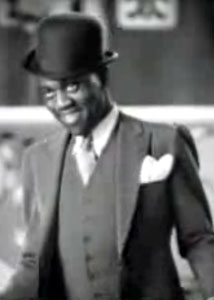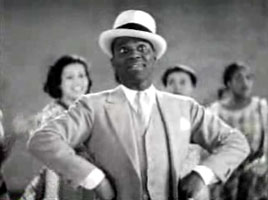 "Way Down Upon the Swannee River" plays brassily behind the opening credits, quickly turning from folksy to a jazz number.
"Way Down Upon the Swannee River" plays brassily behind the opening credits, quickly turning from folksy to a jazz number.
We're entering a two-reel Vitaphone musical short, King for a Day (1934), starring the legendary tap dancer Bill Robinson.
If you peer behind the words of the two credit cards you'll see a street sign, which informs us the story is set at West 142nd Street & Lennox Avenue, i.e., the heart of Harlem.
At a rehearsal for Brown's Black Orchids, we see many chorus dancers through a doorway practicing tap in two lines. Mr. Brown (Ernest Whitman) in a bowler hat tells his employees not to let dancer Bill Green (Bill Robinson) in the building, as Brown hasn't any time to audition for unneeded new dancers.
Bill fast-talks his way into the building & demands an audition "your audience will be wild about." Brown insists he's invested too much in the upcoming show, & it's too late to take a chance on an amateur. Bill insists he's a pro, having had a lucrative gig dancing on street corners.
The scene of Bill winning his audition with a craps game was racially stereotypical, but in this case, Bill Robinson was just such a gambler in real life, & seemed to relish his reputation as such. So we're lucky the story didn't include the fact that he was also a brawling womanizer.
Green wins the entire show. He changes the name of Brown's Black Orchids to Green's Black Orchids & is soon modernizing out-moded chorus dance routines. He fires the old-time choreographer & calls the girls around him, singing to them:
"Girls, I sat up last night, right on side the bed/ I wrote a stomp it's just too bad chillun it'll knock you dead/ I know you've all danced the Charleston, the Black Bottom away/ Now just stand at attention, prance awhile, do just as I say..."
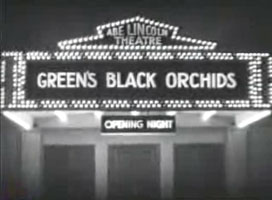 He continues singing "The Bill Robinson Stomp" written for this Vitaphone two-reeler by Cliff Hess. He continues singing "The Bill Robinson Stomp" written for this Vitaphone two-reeler by Cliff Hess.
Hess wrote many Vitaphone tunes mimicking popular styles, & this is a nice jazzy little number perfect for Bojangles' limited vocal range. The lyrics become an instructional for the girls, with whom he dances his new stomp. It's just cool & a half, too.
Bill then meets with the costume & stage design guys, finding their work "copasetic," a word of slang Robinson personally popularized & possibly even coined. They need collectively to be paid $2,500 -- so once more, out come Bill Green's dice.
The next night the show opens at the "Abe Lincoln Theater." This was one of the great theaters of the Harlem Rennaisance, famous for its jazz concerts featuring the greatest of the ragtime era onward. It closed in 1984 but was restored at great expense in 1993 & has since remained an important cultural & entertainment center.
The curtain opens & dancers are arranged on along tiers. Muriel Rahn & Babe Matthews take turns (Hattie first) singing verses of a rollicking jazz tune, "Love's Old Sweet Song," composed by J. L. Molloy & J. Clifton Bingham.
It's splendidly sung by both women in long ermine-caped gowns. Then out strut "baggy pants" vaudevillian clowns Eddie Matthews, Dusty Fletcher, & Limehouse Brown, all three in blackface.
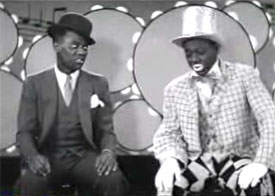 It seems very odd now, but in 1934 it was only beginning to get iffy for comics on the black vaudeville circuit to wear black face. And this film provides an opportunity to see three authentic black vaudeville performers exactly as they looked when they performed for the black community. It seems very odd now, but in 1934 it was only beginning to get iffy for comics on the black vaudeville circuit to wear black face. And this film provides an opportunity to see three authentic black vaudeville performers exactly as they looked when they performed for the black community.
Eddie's wearing a black suit & tophat. Dusty's wearing a white jacket, white tophat, & checkered baggy pants. Limehouse is wearing black suit & tophat, white gloves & white socks flashing. They slide around as the girls keep singing.
Then out comes Bill "Bojangles" Robinson as Bill Green to join in the comedy presentation, though without the traditional blackface (Robinson was among the first generation to balk at that minstrel show tradition, but many a comedian really believed the mask was essential & were among the last to give up the burnt cork).
Everyone sits along the tiers & Bill & Dusty do a comedy routine. Limehouse & emcee "Mr. Delacadeux" also do a comic/straightman exchange. The humor hasn't worn well with time but is historically consequential to the history of entertainment.
Soprano Muriel Rahn performs Max Kester & Roy Noble tune "Love Locked Out." This is sung in a classical mode trying to be torchy, not a jazz number. Muriel is beautiful, but her high notes are a bit squally:
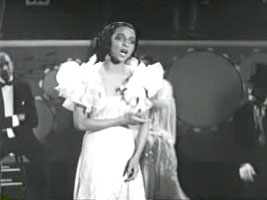 "Love locked out, in all the cold & rain/ Love locked out, will never come again...." Even Bill's bored by it, & takes out a deck of card to deal out with Dusty. "Love locked out, in all the cold & rain/ Love locked out, will never come again...." Even Bill's bored by it, & takes out a deck of card to deal out with Dusty.
Dealing out cards on the stage while Muriel performs is weirdly rude, as the song is presented in complete seriousness.
Muriel was an activist for civil rights & a champion of African American arts, & was the first African American woman to appear on national television (on Ed Sullivan's Talk of the Town variety hour in 1951).
But she was to have some tough moments in her life, with a husband (actor & fellow activist Dick Campbell) who was berated in the papers for beating her even in public. She was destined to commit suicide at age fifty, beating terminal cancer to the punch.
When she finishes "Love Locked Out," Dusty & Bill have another joke moment. For more about Dusty, see reviews of Boarding House Blues (1948), Killer Diller (1948), Rufus Jones for President (1933), & Open the Door, Richard (1945).
At long last it's time for Bill to start tapdancing, performing a lengthy medley of "Swanee River," "Old Black Joe," "There are Smiles" & "Love's Old Sweet Song," in his very pleasing old-time style. Some have called Bill Robinson the best tapdancer of all time. He never was that. But he was the best representative of a conservative style of dance that predates the more dramatically athletic tap.
Bill "Bojangles" Robinson was signal in developing that earlier style, & especially popularized the "staircase" act of tapdancing up & stairs. After the Nicholas Brothers added flying leaps over each others' heads on the tapdance staircase, Robinson seemed rather less & less athletic, & more & more nostalgic. Yet he would remain for life associated with tapdancing on stairs, & was scarcely ever filmed without a staircase moment.
We're seeing history in these moves, & it's fun to watch besides. And he has so much personal charisma it's just thrilling to watch him. There's genuine musicality in his feet.
When he taps off stage, he encounters Mr. Brown in the wings. Brown congratulates Green on the the success of a show he won from him in a craps game. They get involved in another craps game, & we just know what that means.
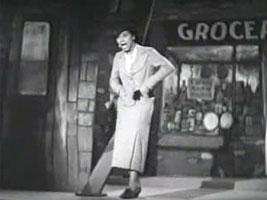 Meanwhile on stage, Babe Matthews is singing "Got the Jitters" composed by John Jacob Loeb, Billy Rose, & Paul Francis Webster. Meanwhile on stage, Babe Matthews is singing "Got the Jitters" composed by John Jacob Loeb, Billy Rose, & Paul Francis Webster.
Babe's wearing a long grey coat, standing at the curb of a city street of expressionist design. It's dark. Only a few others are on the street, walking along their ways.
This is an amazing, dramatic number performed so darned well. The song was written for the Ziegfield Follies of 1934, & the doomful gloominess of the number is really about the falling stockmarket. The greatest bands of the era recorded it, but none have anything over Babe's chilling interpretation.
Then at the instrumental break, the dancers come on stage hunched over like ghosts or ghouls & perform a dance routine in which their shadows loom threateningly -- Michael Jackson's choreography for the music video Thriller (1982) comes to mind! It's almost too good to be real, but there it is.
Meanwhile Bill's losing the show back to Mr. Brown. He's lost half the show so they're now equal partners. "Don't go nowhere now!" says Bill, as it's time for his next number, & he rushes on stage.
The chorus girls are in flouncy Victorian gowns, hats, & parasols. Babe Matthews & Muriel Rahn come to the front of the chorus & share a vocal for "A Harlem Wedding." They then rejoin the chorus, & out come the tubby bride (Hattie Noel) & Bill Green with the minister.
They get married between two rows of chorus girls. Dancing breaks out all round, & the stork flies in with a baby. This was another tune written by Hess, & weaker than most of the material in the show, except for the production & choreography which is big stuff for a two-reeler, & very entertaining.
Even by the title we knew Bill couldn't stay a successful producer, being only a king for a day. So almost as soon as he's off the stage & again tossing dice, Mr. Brown wins back his show. Which is only fair. Except that Brown hasn't learned a thing & still thinks Bill's an amateur, firing him from the successful show. But oh well, just down the hall is another production in progress, "Snow White & the Black Birds," & as Bill walks by the door, he hears dice rattling.
Good golly this was a fun film, with higher production values than usual for director Roy Mack. The comics in blackface are the only part that has dated uncomfortably, & reliance on the craps-playing stereotype to frame the story. For the rest, the talent is just stunningly grand throughout, the sets exciting, the music & dance first-rate.
The following year Bill Robinson would make the first of his films with Shirley Temple, & really this Vitaphone two-reeler was what passed for a screen test to assess Robinson's presence on the big screen. Obviously a bit more of a budget went into it than usual, as Warner Brothers didn't want low production values as an excuse if Bill didn't go over. But he did go over, & his film career was off like gangbusters, even though in the long run he would be a lot more disappointed with roles which did not live up to his aspirations.
copyright © by Paghat the Ratgirl
|
